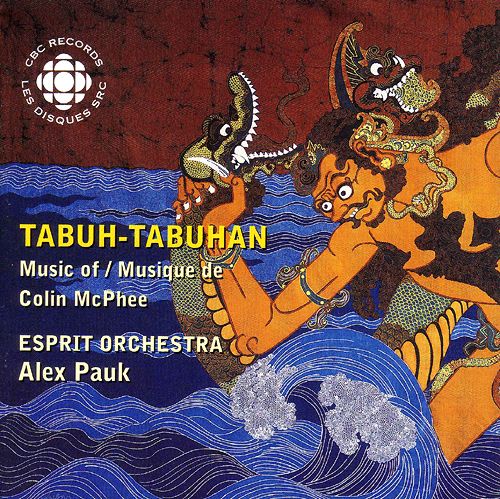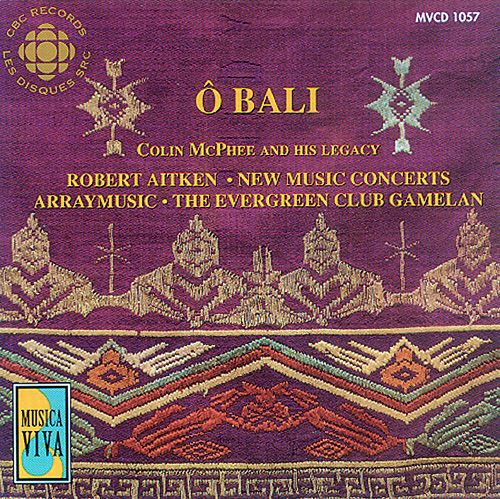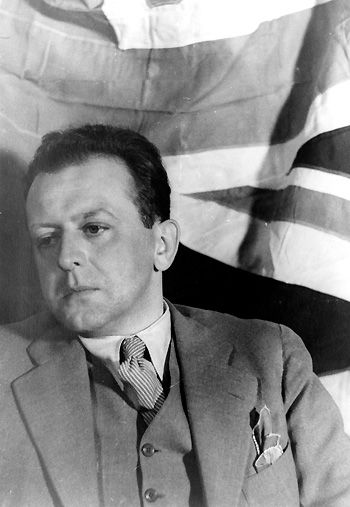wimpel69
04-21-2014, 01:39 PM
Sharing on these albums has ended. No more requests and no re-ups, please!
"A gamelan is a traditional musical ensemble from Indonesia, typically from the islands
of Java and Bali, featuring a variety of instruments such as metallophones, xylophones,
kendang (drums) and gongs; bamboo flutes, bowed and plucked strings. Vocalists may
also be included. For most Indonesians, gamelan music is an integral part of
Indonesian culture."
Born in Montreal, Canada, Colin McPhee (1900-1964) was a distinctive and imaginative
composer, ethnomusicologist, pianist, and writer, most noted for absorbing the sounds of Balinese
music into his own compositions. He came to the U.S. to study at the Peabody Institute in Baltimore,
where his composition teacher was Gustav Strube (1867-1953). He returned to Canada to study
piano with Arthur Friedheim in Toronto. The Toronto Symphony gave his First Piano Concerto a
world premiere in 1924. He left Toronto for Paris to study piano with Isidore Philipp, and
composition with Paul Le Flem.
Even McPhee's early music has a marked tendency to use layers of ostinati. When he first heard
cylinder recordings of Balinese music he was entranced. He married Jane Belo, an anthropologist
(and graduate student of Margaret Mead). They traveled to Bali, where Jane built a home in the hill
country. McPhee vigorously notated the melodies and rhythmic devices of every gamelan he heard.
He is credited with saving a number of gamelans that were likely to go out of existence, and of
resurrecting some older instruments and styles. The couple adopted a child, Samphi, who later
became a member of a Balinese dance troupe that toured the United States.
He worked for the rest of his life on a serious study, Music in Bali, which was published posthumously
in 1966. He also wrote transcriptions for Western instruments, and original compositions full of the
sound, melodies, and rhythms of gamelan music. The most famous of these, Tabuh-Tabuhan,
for orchestra, was premiered during a trip he made in the summer of 1936 to Mexico, conducted
by Carlos Ch�vez.
McPhee and his wife sold their house, left Bali, and divorced in 1939. In the early 1940s McPhee
lived in a large brownstone in Brooklyn, shared with other artists and literary figures such as
Leonard Bernstein and Benjamin Britten among many others. McPhee, Britten, and Bernstein are
said to have fought all the time over who got to play the grand piano. Britten and McPhee participated
in the first recording of McPhee's Balinese Ceremonial Music for two pianos and flute in 1941.
The strain of Balinese sounds that runs through Britten's music clearly originated with McPhee.
In the later 1940s, McPhee, lonely for his beloved Bali, slipped into an alcohol-deepened depression,
and his output drastically declined. He pulled himself out of the depths and produced new
compositions in the 1950s. In 1958 he was appointed professor of ethnomusicology at UCLA,
and he became an esteemed jazz critic.
This collection includes:
Symphony No.2, "Pastorale"
Tabuh-Tabuhan (Toccata on Balinese Folk Themes)
Concerto for Small Orchestra
Nocturne
Transitions
Lagoe Sesoeloelingan Ardja
Suite in 6 Movements
Kambing Slem
+ Jose Evangelista, � Bali
+ Mark Duggan, Evocation ''Gentle Rain Falling''
+ Jon Siddall, Jakarta Sleep
+ Andrew Timar, Leaves from Palimpsest


Music Composed by
Colin McPhee
Jose Evangelista
Mark Duggan
Jon Siddall
Andrew Timar
Played by the
Evergreen Club Contemporary Gamelan
New Music Concerts Ensemble
Esprit Orchestra
Conducted by
Robert Aitken
Alex Pauk
"Tabuh-Tabuhan was written in the 1940s after Colin McPhee returned to America after living for
most of the 1930s in Bali. In this musical suite, he captures the percussive excitement and rhythmic
propulsion of the Indonesian gamelan orchestra. The music is part ethnic, part jazz, part western
classical. As a western resident in Bali who never tires of the sound of gamelan, I consider
Tabuh-Tabuhan to be a very successful meeting of musical east and west. The Esprit orchestra
captures the spirit of the music and runs with it."
CD Universe Reviewer

One of two(!) photos of McPhee you can find on Google.
Sharing on these albums has ended. No more requests and no re-ups, please!
Enjoy! Don't share! Buy the originals! :)
"A gamelan is a traditional musical ensemble from Indonesia, typically from the islands
of Java and Bali, featuring a variety of instruments such as metallophones, xylophones,
kendang (drums) and gongs; bamboo flutes, bowed and plucked strings. Vocalists may
also be included. For most Indonesians, gamelan music is an integral part of
Indonesian culture."
Born in Montreal, Canada, Colin McPhee (1900-1964) was a distinctive and imaginative
composer, ethnomusicologist, pianist, and writer, most noted for absorbing the sounds of Balinese
music into his own compositions. He came to the U.S. to study at the Peabody Institute in Baltimore,
where his composition teacher was Gustav Strube (1867-1953). He returned to Canada to study
piano with Arthur Friedheim in Toronto. The Toronto Symphony gave his First Piano Concerto a
world premiere in 1924. He left Toronto for Paris to study piano with Isidore Philipp, and
composition with Paul Le Flem.
Even McPhee's early music has a marked tendency to use layers of ostinati. When he first heard
cylinder recordings of Balinese music he was entranced. He married Jane Belo, an anthropologist
(and graduate student of Margaret Mead). They traveled to Bali, where Jane built a home in the hill
country. McPhee vigorously notated the melodies and rhythmic devices of every gamelan he heard.
He is credited with saving a number of gamelans that were likely to go out of existence, and of
resurrecting some older instruments and styles. The couple adopted a child, Samphi, who later
became a member of a Balinese dance troupe that toured the United States.
He worked for the rest of his life on a serious study, Music in Bali, which was published posthumously
in 1966. He also wrote transcriptions for Western instruments, and original compositions full of the
sound, melodies, and rhythms of gamelan music. The most famous of these, Tabuh-Tabuhan,
for orchestra, was premiered during a trip he made in the summer of 1936 to Mexico, conducted
by Carlos Ch�vez.
McPhee and his wife sold their house, left Bali, and divorced in 1939. In the early 1940s McPhee
lived in a large brownstone in Brooklyn, shared with other artists and literary figures such as
Leonard Bernstein and Benjamin Britten among many others. McPhee, Britten, and Bernstein are
said to have fought all the time over who got to play the grand piano. Britten and McPhee participated
in the first recording of McPhee's Balinese Ceremonial Music for two pianos and flute in 1941.
The strain of Balinese sounds that runs through Britten's music clearly originated with McPhee.
In the later 1940s, McPhee, lonely for his beloved Bali, slipped into an alcohol-deepened depression,
and his output drastically declined. He pulled himself out of the depths and produced new
compositions in the 1950s. In 1958 he was appointed professor of ethnomusicology at UCLA,
and he became an esteemed jazz critic.
This collection includes:
Symphony No.2, "Pastorale"
Tabuh-Tabuhan (Toccata on Balinese Folk Themes)
Concerto for Small Orchestra
Nocturne
Transitions
Lagoe Sesoeloelingan Ardja
Suite in 6 Movements
Kambing Slem
+ Jose Evangelista, � Bali
+ Mark Duggan, Evocation ''Gentle Rain Falling''
+ Jon Siddall, Jakarta Sleep
+ Andrew Timar, Leaves from Palimpsest


Music Composed by
Colin McPhee
Jose Evangelista
Mark Duggan
Jon Siddall
Andrew Timar
Played by the
Evergreen Club Contemporary Gamelan
New Music Concerts Ensemble
Esprit Orchestra
Conducted by
Robert Aitken
Alex Pauk
"Tabuh-Tabuhan was written in the 1940s after Colin McPhee returned to America after living for
most of the 1930s in Bali. In this musical suite, he captures the percussive excitement and rhythmic
propulsion of the Indonesian gamelan orchestra. The music is part ethnic, part jazz, part western
classical. As a western resident in Bali who never tires of the sound of gamelan, I consider
Tabuh-Tabuhan to be a very successful meeting of musical east and west. The Esprit orchestra
captures the spirit of the music and runs with it."
CD Universe Reviewer

One of two(!) photos of McPhee you can find on Google.
Sharing on these albums has ended. No more requests and no re-ups, please!
Enjoy! Don't share! Buy the originals! :)